Lead gen advertising in the automation era: How any brand can succeed
Boost your lead gen strategy with tips on campaign management, sales alignment and maximizing ad performance.
Digital advertising has evolved quite a bit since I started working in paid media. PPC ad platforms work in a completely different way than they did just four or five years ago, with automation and AI featuring so heavily that you can’t work without them.
Lead generation advertisers today have access to tools like broad match keywords and offline conversions – powerful when used right, but chaotic and expensive if left unchecked.
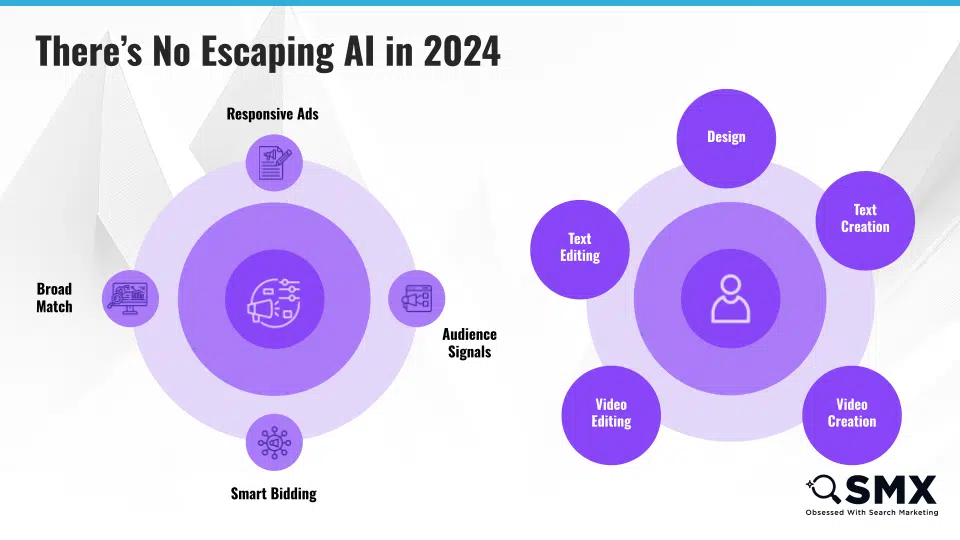
I love the challenge of learning something new. If you haven’t been keeping up with the role of automation and AI in lead gen advertising, this article includes advice and experiences on:
- Managing your ad strategy.
- What AI looks like in different ad platforms.
- Optimizing your landing page experience.
- Aligning marketing and sales efforts.
- Qualifying leads for ad platforms using CRM data.
- Managing new or smaller accounts.
- AI tools to help you level up fast.
Why you should be paying attention to AI in lead gen advertising
AI and automation can make your work more impactful, improve your results and help you get more done in less time. Among the advantages of a well-oiled AI setup are:
- Improved productivity.
- Lower risk of error.
- Always-on account safeguards.
- Scalability across teams and accounts.
- Time to focus on what you enjoy most.
But human oversight remains essential. Algorithms are only as good as the data and inputs we give them, and AI requires oversight. Among the reasons you cannot just set it and forget it:
- Algorithms can and do malfunction.
- The absence of guardrails leads to bad decisions.
- Requires specificity, training to achieve results.
- AI lacks nuance and context that come with human inputs.
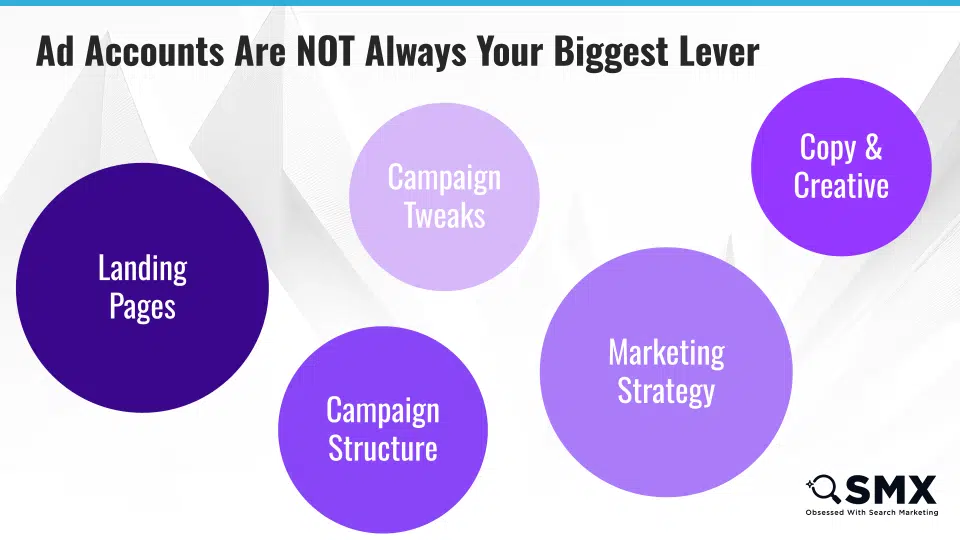
As you implement or level up your comfort with AI, remember that ad accounts are not always your biggest lever for improvement.
Interestingly enough, sometimes you can have a bigger impact on campaign performance by focusing on things that are not in the ad account:
- Landing page optimization.
- Copy and creative.
- Sales process.
- Campaign tweaks and structure.
- Marketing strategy.
Don’t start advertising without these 4 prerequisites
Before you touch your ad account, make sure you have everything that is considered non-negotiable for running lead generation ads. Here we’ll answer three questions:
- What is your ad strategy?
- How will you implement it?
- What can go wrong and how will you cover it?
For example, I like to keep things simple when starting a new campaign or account.
That means typically starting with the bottom of the funnel on paid search, capturing whatever demand is available around action-oriented keywords.
Only after that do I layer on paid social ads such as Meta or LinkedIn.
Here are the four non-negotiables.
1. CRM or other database
Everything you do in lead gen revolves around generating inbound queries. We might call these conversions, but it’s important to remember that no actual sale is being made.
In other words, you’ll be spending money for the opportunity to sell to people.
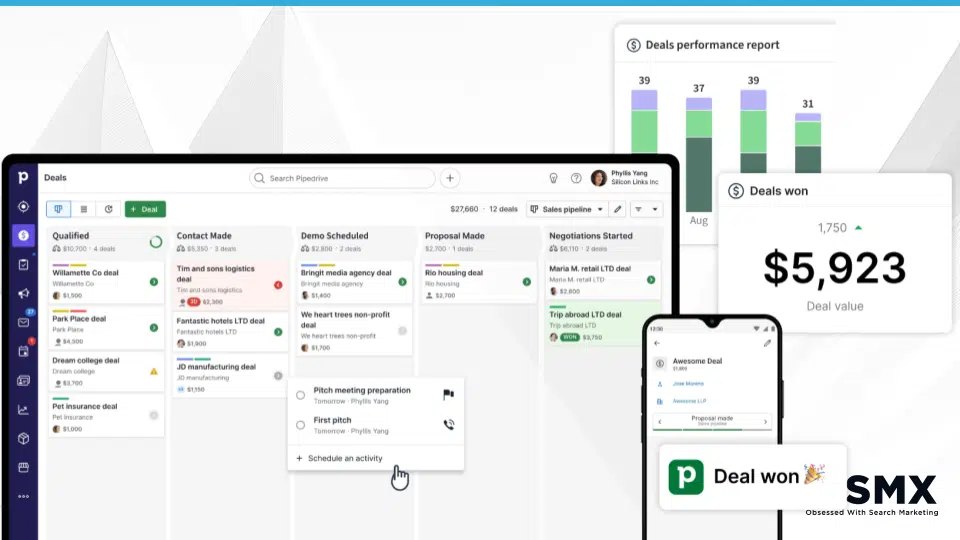
You need a place for those leads to go, a process and people to follow up with them and a way to determine which ones are most valuable to your business. This last one is especially important as it’s the only way lead gen advertisers can tell ad platforms which conversions they want to see more of.
If you’re just starting out or have a limited budget, HubSpot and Pipedrive are examples of affordable CRMs that work well right out of the box.
2. Spam protection
AI algorithms don’t target people with your ads based on magic or random choice; they use your conversion data. If you get too many low-quality conversions, it begins a vicious cycle where the system will think it did well and go after more of the same.
Before you advertise, it’s important to block spam from making it past your landing page and triggering the conversion tracking pixel. Something like a reCAPTCHA will drastically reduce the number of bots and spammers who end up in your CRM.
3. Lead qualification and engagement process
The real work of a lead gen business begins when a lead hits your CRM. To know if you’re approaching this correctly, ask yourself questions such as:
- What does our sales process look like?
- How fast do we reach out to new leads?
- How often do we follow up?
- Are we reaching out multiple ways (e.g., email, phone, SMS)?
- Do we even have a sales process?
Businesses without a documented sales process are more common than you realize. It’s one of the biggest contributors to confusion and missed opportunities.
4. Expert who understands the ads space
Many agencies think ad platforms are driving us out of business with their push to automated campaigns and AI features.
This couldn’t be further from the truth.
Businesses committed to growth need agencies more than ever before – not only to do the work and get results, but to help them navigate evolving platforms based on their years of experience.
Not all traffic is equal and not every business will see results from the same strategy. It’s important that you have an expert or team with a strong understanding of the different platforms you plan to advertise on.
Campaign management: What AI and automation look like in 2024
You’ve built a plan, set your goals and found someone with the expertise to get it all done.
Now what?
Let’s go over what campaign management looks like today using AI and automation.
AI in ad platforms in 2024
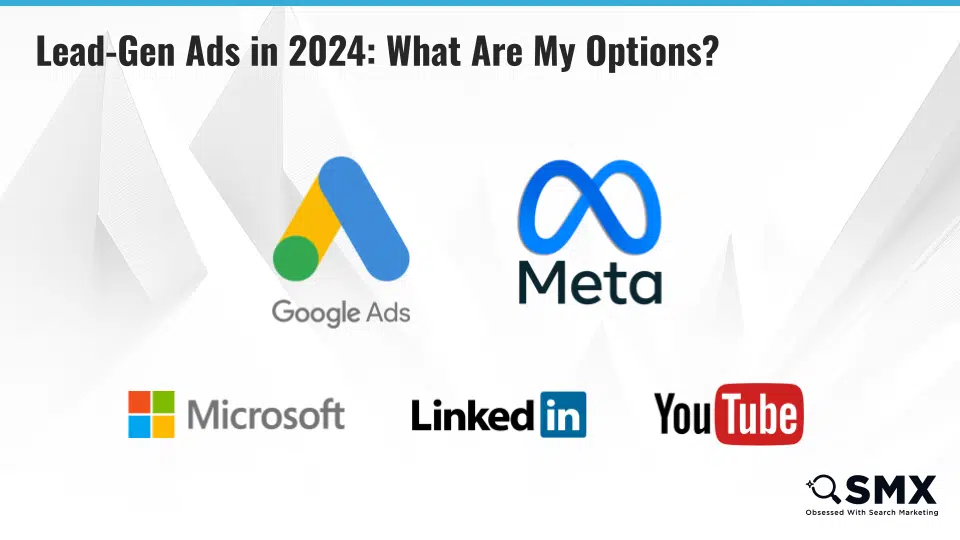
There are literally millions of places to advertise on the internet, and you can use a wide variety of ad formats.
In addition to established platforms like Google and Meta, lead gen advertisers can also consider emerging ones (like TikTok), niche ones (like Pinterest) and underrated ones (like Twitch and other Amazon non-endemic platforms).
For lead gen, my typical recommendation is to keep it simple and start where the most traffic is available.
- Capture a large portion of search-based demand on Google + Microsoft.
- Then generate new demand and retarget users on YouTube, Facebook, Instagram, LinkedIn, etc.
Start with the basics
Keep your initial approach simple, as there is not much to gain from AI at the outset before you acquire enough conversion data.
- Paid search: Google + Microsoft, Phrase + Exact Match, Manual Bids
- Paid social: Facebook + Instagram, Retarget Web Visitors
Lean more toward manual bidding and strong negative keywords, using AI tools like Gemini for Search to help ideate or write copy. The goal of these early weeks is to gather data and allow AI to have a sizable base to work off.
Scale up using AI
As you begin to gather data and increase the scale of your efforts, you’ll start to lean into more algorithmic offerings, especially Smart Bidding.
Algorithmic bidding has improved rapidly over the years and is now miles ahead of manual bidding. It looks at thousands of data points in real-time as it adjusts bids for every single auction you enter – something we have neither access to nor the capability to do.
You may wish to remain on manual bidding where the data volume is too low for Smart Bidding to succeed.
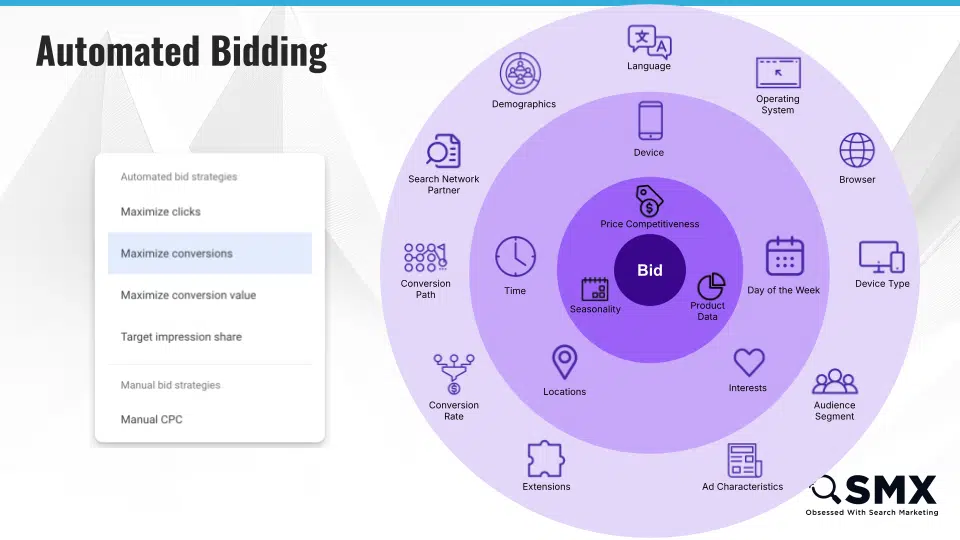
You can also start audience expansion on social media.
- Paid search
- Google + Microsoft
- Phrase + Exact Match (Manual Bids)
- Broad Match (Smart Bidding)
- Paid social
- Facebook + Instagram
- Retarget Web Visitors
- Target Customer Lookalikes or Specific Interests
You can consider more automated campaigns, such as Performance Max (Google) and Advantage+ and Tailored Campaigns (Meta).
These advanced campaign types remove granular controls for more reliance on the platform’s algorithms. Here, your job is to allow the machines to work, guiding them with data and inputs to control performance indirectly.
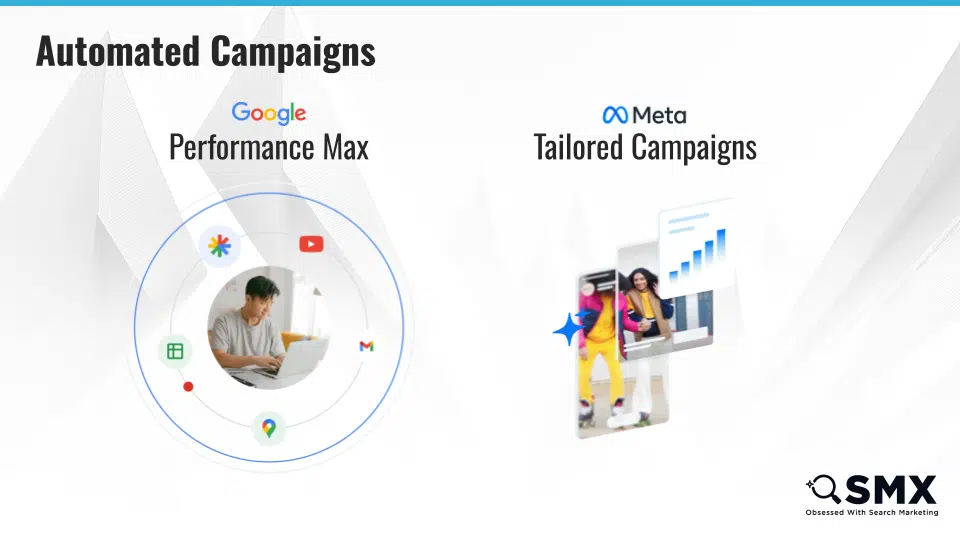
Targeting is also becoming much more automated. Performance Max and Tailored Leads campaigns with Advantage+ audiences, audiences are simply signals – suggestions for the algorithm as opposed to targeting lists.
Unlike ecommerce where broader targeting works better, with highly specialized lead gen, I find that specific audiences work well on both Meta and Google:
- Lookalikes of your existing customers.
- Detailed interest targeting.
- People who work in specific industries or companies.
- Life events, parental status, relationship status, etc.
Dig deeper: Paid search for lead gen: Tips for new accounts with limited budgets
Landing page experience
Here are the four most important things to keep in mind as you optimize your landing pages.
Keep designs responsive
I often see websites and landing pages that neglect mobile-optimized design. While there are some niche lead gen verticals where desktop design still dominates (such as SaaS), you’re generally better off building for mobile first.
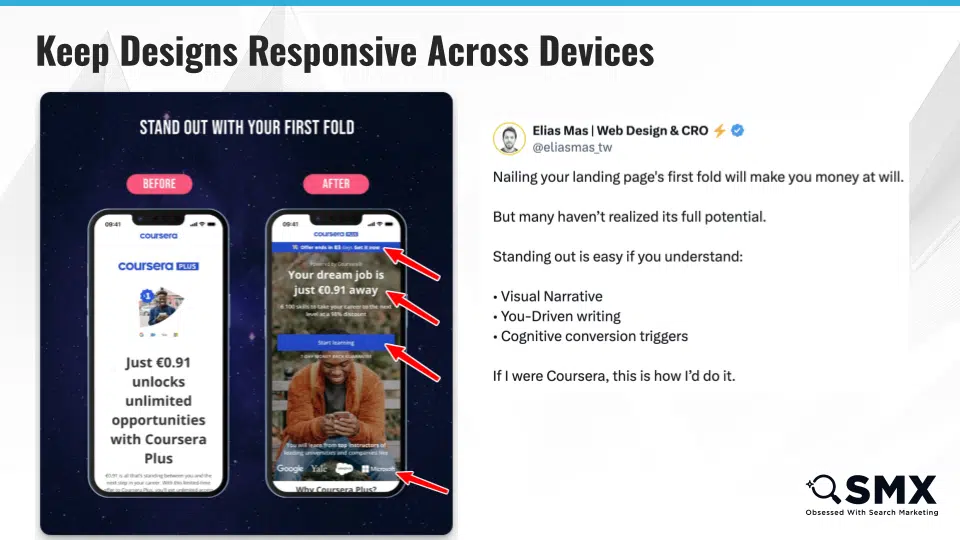
In the example above, you can see how the page becomes more appealing and will likely convert better by:
- Adding scarcity.
- Having a clear headline.
- Featuring a prominent CTA above the fold.
- Including social proof.
Spend the extra time to get these right.
Don’t test everything
Whether you’re trying to improve a low-performing page or have one that’s working well, it’s important not to spend time and money running tests that won’t make much of a difference.
Instead, test variations of elements that make the biggest impact, such as:
- New headlines.
- Different CTAs.
- More relevant social proof.
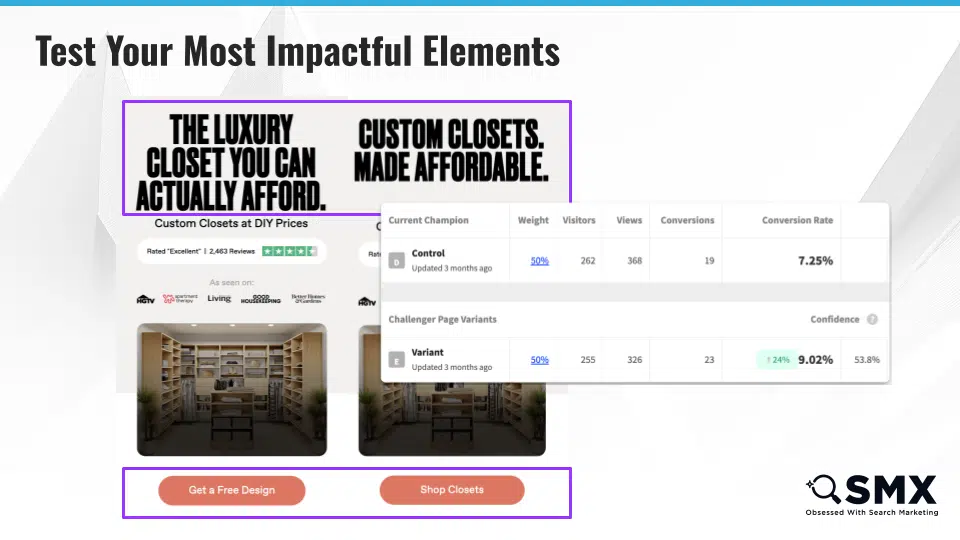
Clear over clever for copy
Sometimes, I come across a headline that is very clever. And while I can appreciate it as a marketer, your target audience might not understand what you are offering.
Don’t try to be clever at the cost of clarity. Your visitors have a finite amount of time to find a solution for whatever is bothering them, and you have only a fraction of that time to sustain their interest. Clear copy simply gets the job done.
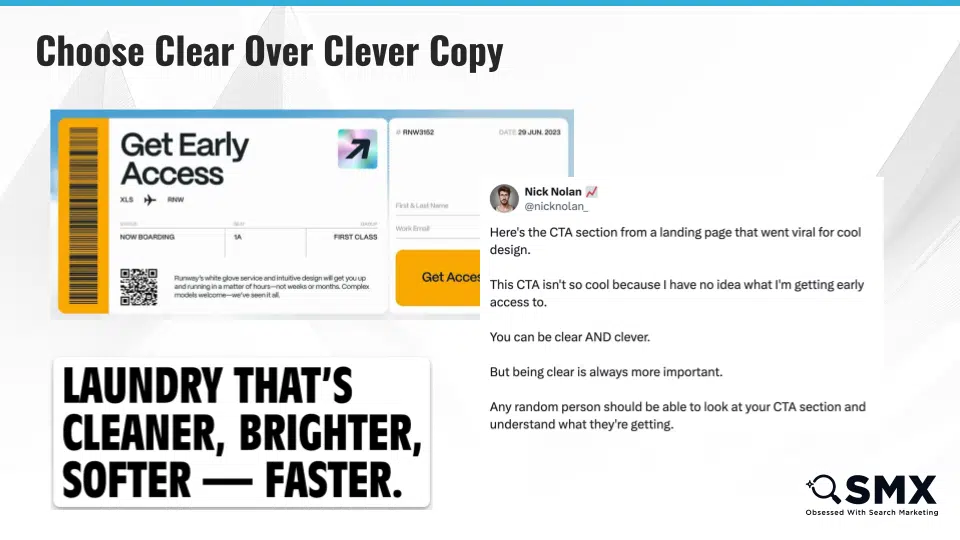
Deliver what your ad promised
Many advertisers check their ads or forms, but few test the end-to-end experience.
Review and click on your ads. Make sure it leads to a logical conclusion on the landing page. Fill out your form or make a test call.
You want everything working as intended. The last thing you want to do is drop thousands of dollars on a broken funnel.
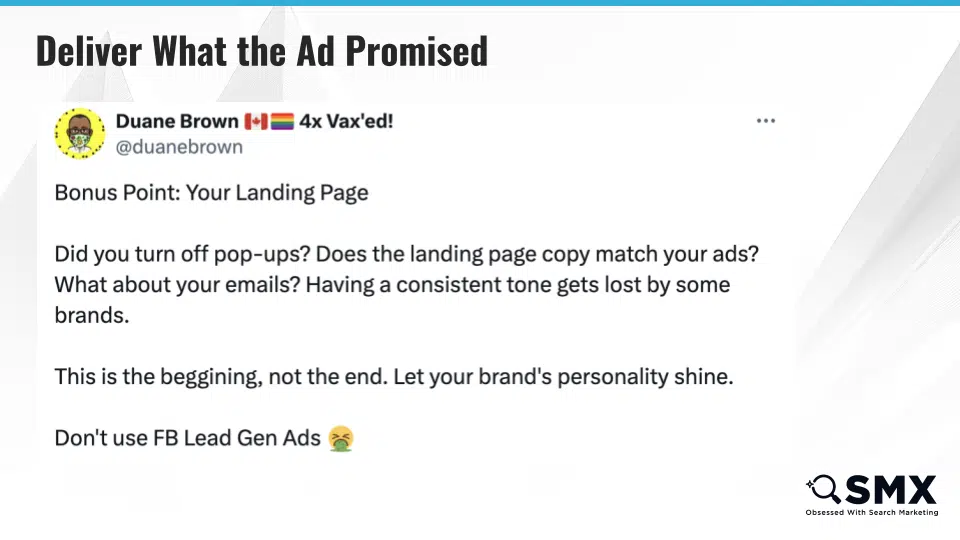
Post-conversion sales process
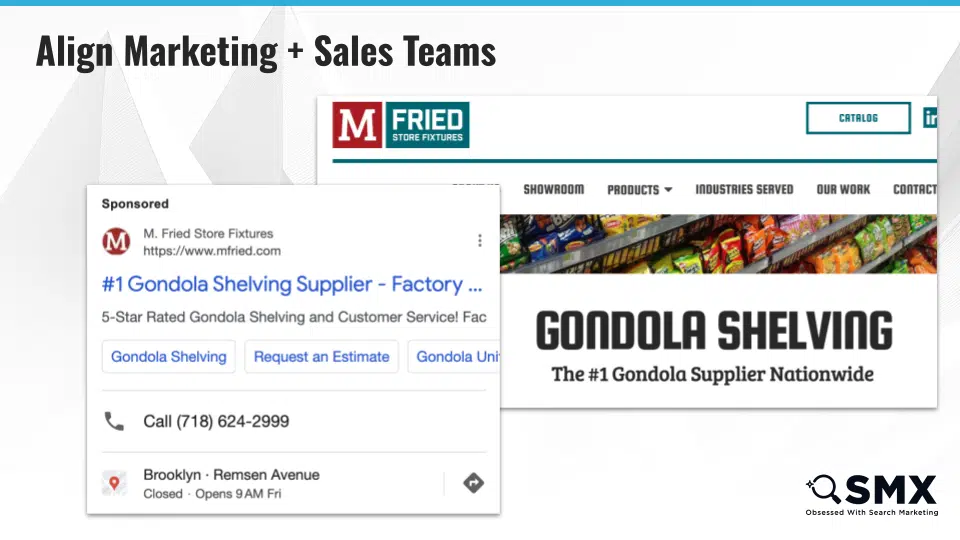
Because lead gen conversions aren’t sales, the post-conversion process has to be dialed in. At the end of the day, everyone is advertising to make money. If you can’t go from lead to closed deal often enough, you might need to rework one or more of these areas.
- Alignment between marketing and sales. Your ads and landing pages should speak to your prospective customers using the same language as your sales team. Your ads and landing pages should use the same language and design principles as your sales emails, pitch decks and other marketing materials.
- Ability to address objections proactively. Speak to your customers’ pain points before they bring them up. How will your product or service help them? Landscaping clients may be worried about the effects of chemicals on soil. Let them know that you’ve thought this through.
- Quality of leads. Make sure you connect your CRM and map your sales pipeline in the ad platforms, so that you can later highlight which conversions were most valuable to your business. You can fire the pixel on your webpages or submit conversion actions with a tool like Zapier.
- Sales cycle alignment. The whole point of getting leads is to follow up with them. If you aren’t doing this, you’re wasting your ad spend! And remember, if your sales cycle is longer than 90 days, you’ll need to upload offline conversions into Google with relative data or the Google Click ID that identifies a conversion will expire.
Qualifying leads for ad platforms using CRMs and offline conversions
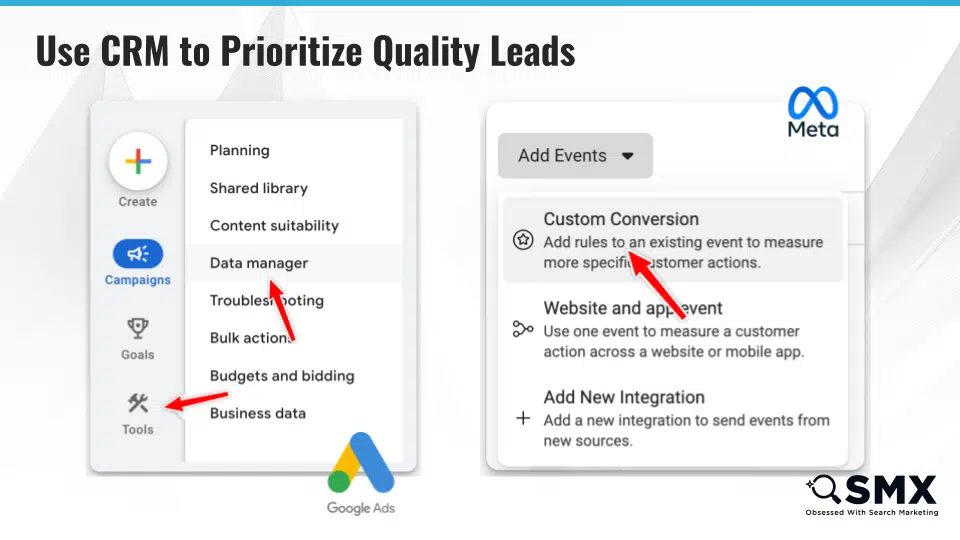
I’ve stressed the importance of lead quality and using offline conversions for lead gen advertising. Here are three simple steps for achieving that.
- Connect your CRM. Google Ads offers a direct connection to HubSpot, Salesforce and certain other tools. Everything else can be connected through Zapier. Meta also allows you to set up custom conversion actions.
- Recreate your sales pipeline. If you have three levels of lead qualification before a deal closes, you’ll need to assign each stage a value based on your real-world conversion data. If you can’t use exact values, use figures with the same rate of conversion from stage to stage.
- Teach the system. Help the ad platform understand which leads progressed through your pipeline and which ones were irrelevant, unqualified or unreachable. Working with data is no longer optional if you want to get results.
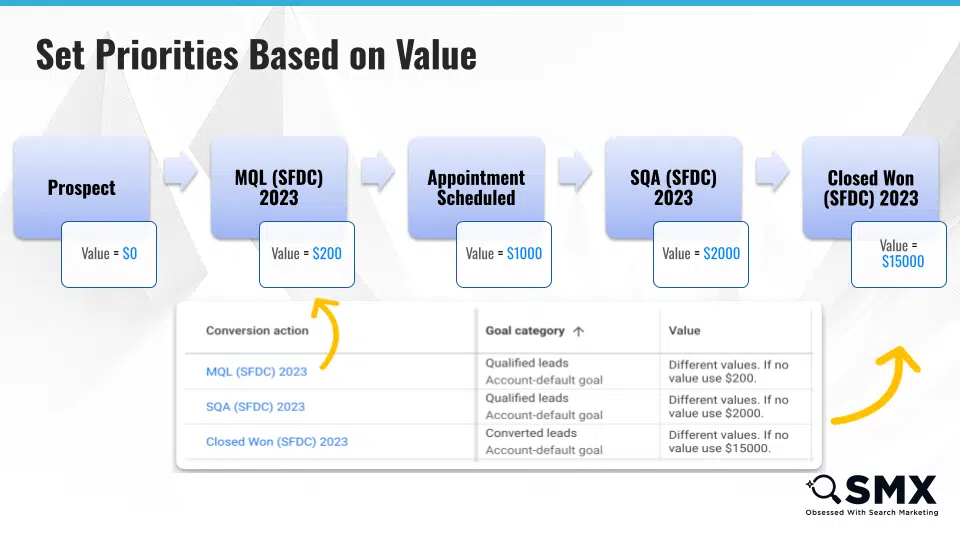
Free and affordable tools to get comfortable with AI
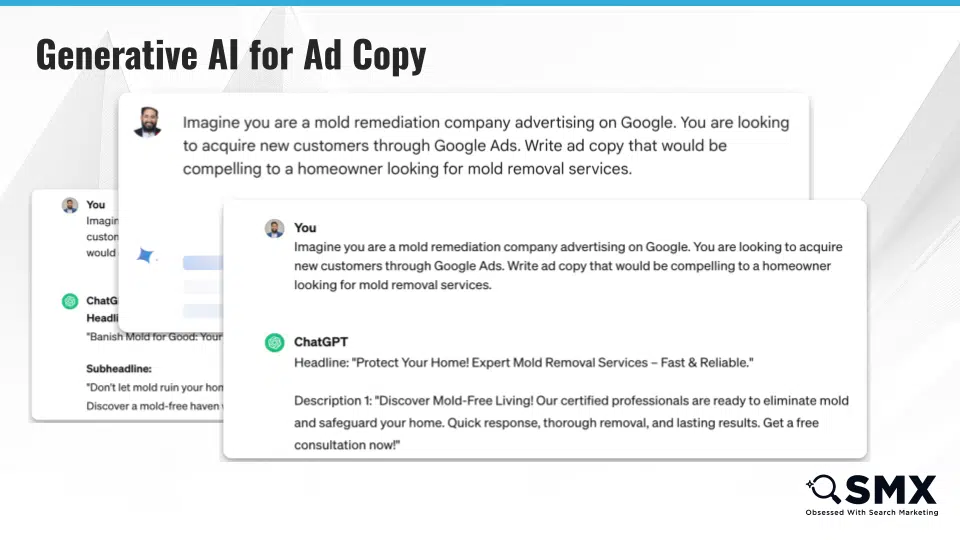
How can you use free or affordable AI tools to level up your strategy? I’ll walk through a few ideas and tools now:
- Ask ChatGPT or Gemini questions about your target demographic. Review it and let it inform your go-to-market strategy, such as handling objections. If you sell custom kitchen cabinets, you might ask it:
- What worries the typical homeowner in a given region.
- What keeps them busy.
- Who the local competitors are.
- You can also use LLMs to ideate copy for your ads and landing pages. Generative AI is great for ideation, such as asking for 10 headline ideas for a specific pain point. I don’t typically recommend using these as they are, but work through them to see what makes sense. It can do some of the heavy lifting for you.
- Google Ads has the functionality to generate headlines/descriptions using Gemini for Search or to generate images in Performance Max campaigns.
- Two more cool tools hidden in Google Ads in the Asset Library are the ‘Add Voiceover’ and ‘Trim Video’ functions. The latter creates shorter versions of your video assets, which is great for creating variations or condensing short videos further.
- Third-party tools like Opus Clip can take a long video, add subtitles and select clips from your longer video for short-form clips to support you across any channel.
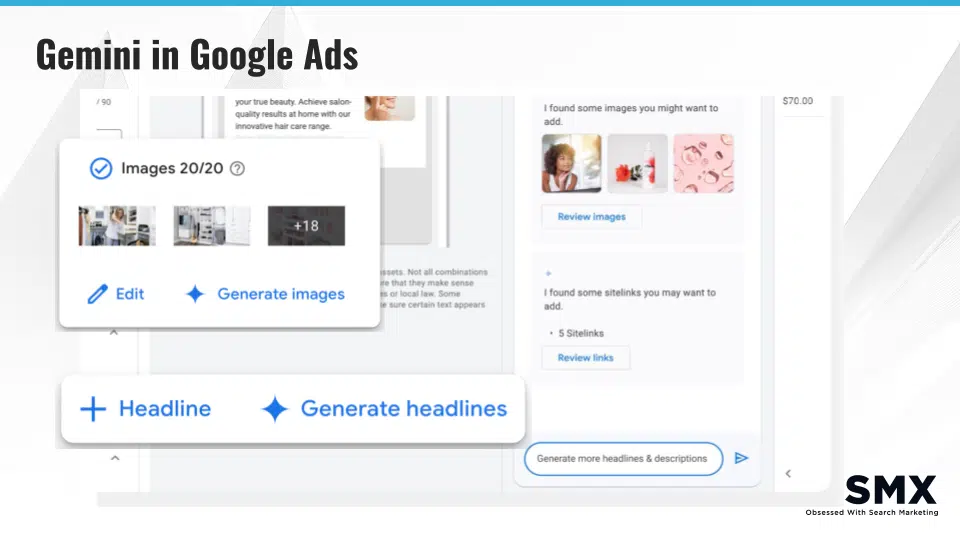
Don’t leave AI testing until it’s too late
Getting started with AI for ads – or trusting an agency to do so on your behalf – can feel daunting.
It’s important to remember that some AI and automation is required while other decisions are fully optional, such as running a Performance Max campaign.
These tools are powerful and ad platforms love them, but they don’t work in every situation.
What’s important is that you remember to follow the steps outlined in this article:
- Start by building your strategy.
- Set yourself up for success by minimizing spam.
- Ensure that you understand the limits of AI.
- Clearly showcase what sets your business apart.
- Qualify your leads and learn from the data.
- Exercise caution, especially with lower budgets.
- Take advantage of free and affordable tools.
Ad platforms have a ton of data points to make bidding and targeting decisions with. You will never see these, but they’re there – and they work. Lean into this and take advantage, but exercise caution.
I resisted change for a long time because I wanted control.
Ultimately, I realized that automation and AI are just two new options in the toolbox.
\If you haven’t adopted some form of them already, you’re late to the game – but not too late. Get started today or risk being left further behind.
Dig deeper: Google Ads for lead gen: 9 tips to scale low-spending campaigns
Watch: Lead-gen advertising in the automation era: How any brand can succeed
Here is the complete video of my SMX Advanced 2024 presentation.
Contributing authors are invited to create content for Search Engine Land and are chosen for their expertise and contribution to the search community. Our contributors work under the oversight of the editorial staff and contributions are checked for quality and relevance to our readers. The opinions they express are their own.
Related stories
New on Search Engine Land